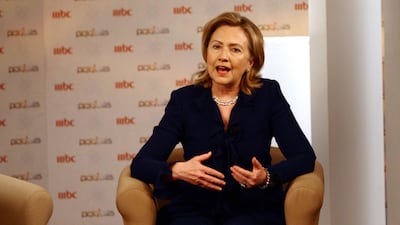ABU DHABI // Hillary Clinton, the US secretary of state, said in Abu Dhabi today that Iran was fuelling conflicts in the Middle East and was not interested in peace between Israel and the Palestinians.
Speaking to the audience of the Kalam Nawa’em television show, which was made up mostly of students from Zayed University in the capital, Mrs Clinton said that the sanctions imposed on the Islamic Republic had slowed down its nuclear programme.
Making her first public appearance as part of a tour of three Gulf countries, Mrs Clinton told the students that Iran acquiring nuclear weapons would draw the entire region into a devastating arms race.
She reiterated a US preference for a two-state solution, saying there should be more support for the Palestinian Authority but that Arabs also had to recognise Israel’s legitimate security needs.
When asked about Israel’s nuclear arsenal, Mrs Clinton only said that the US wanted a nuclear-free Middle East.
She said the fallout from the release of diplomatic cables by the whistle-blowing website WikiLeaks was not long-term, and that Gulf allies, who were portrayed as increasingly hawkish on Iran, had understood that the leaks were not intentional.
But she said she had reached out to many leaders on what she said was akin to an “apology tour” for the leaks, while saying the US had the right to prosecute those who leaked the documents.
Mrs Clinton dismissed an assessment by the outgoing Mossad chief that Iran would not be able to acquire a nuclear bomb until 2015, saying the timeframce should not affect the pressure that the international community was bringing to bear on Iran.
“The timeline is not so important as the international effort to try to ensure that …, Iran is not pursuing nuclear weapons,” she said en route to Abu Dhabi. “I don’t know that it gives much comfort to somebody who is in the Gulf or is in a country that Iran has vowed to destroy that it’s a one-year or three-year timeframe.”
Mrs Clinton spoke broadly of the role of women in the Middle East, praising the Gulf countries for giving a role to women in politics and government. She said part of the goal of her tour was to expose a Western audience to women in the region to break the stereotype of oppressed Middle Eastern women, while acknowledging that challenges remain.
kshaheen@thenational.ae


